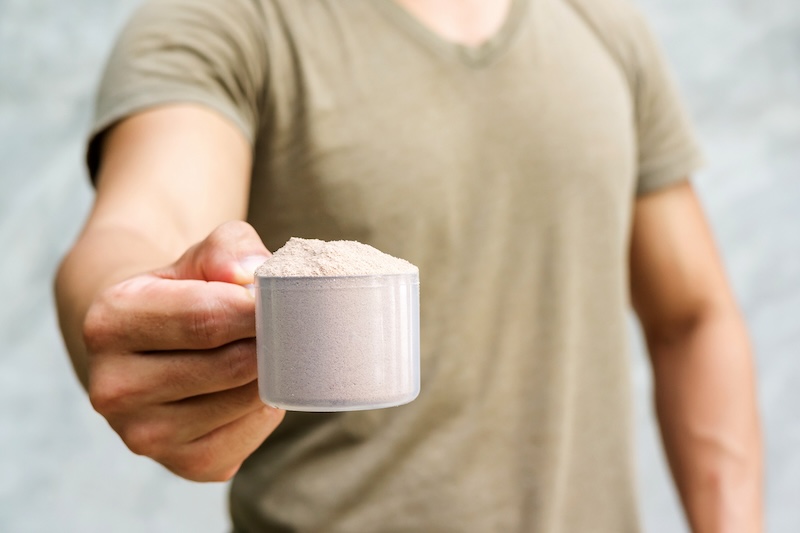The Rise of Protein Powder
There’s no doubt about it that the global protein supplement market is on the rise at break-neck speed. In fact, the total market share is projected to increase from $28.1 billion in 2024 to $55.3 billion by 2032. With so many options available, getting started with choosing the right one can be intimidating.
Protein supplementation can be traced all the way back to Ancient Greece, where an interest in athletics and a muscular physique ruled the minds of many men. In the early 1900s, the first protein supplement hit the market, and in the 1950s, protein powder as we know it today was born.
Today, an aspect of our society that has had a major impact on the protein supplement market is the rise in veganism, as well as growing concerns regarding sustainability and animal welfare. The increased interest in plant-based lifestyles has drastically increased the demand for plant-based protein products. In fact, out of the $26.1 billion spent on protein supplements in 2023, $2.65 billion belonged to plant-based protein.
Protein powders are incorporated into wellness routines for many reasons — to lose weight, to increase muscle mass, to improve sports performance, or just to reach a level of optimal personal well-being. Whatever the reason, protein powders may help you reach your goals if you know what to look for.
Types of Protein
There are seven types of protein powder in a variety of flavors available at the local grocery store, specialty store, and online. Every protein powder falls into one of two categories: whey or plant-based. Choosing the right one for you comes down to your dietary preferences, the taste of the powder, and how easy it is to consume. The seven types of protein powders include:
- Whey Protein: Whey protein is a mixture of proteins isolated from whey, which is the liquid part of milk that separates during cheese production. It’s usually sold as a flavored powder to add to shakes, meal replacements, and protein bars.
- Soy Protein: Soy protein is found in soy products like tofu, tempeh, soy milk, and other soy-based dairy and meat alternatives. It is also made into powder form. Soy protein powder contains all nine essential amino acids.
- Egg Protein: Made from egg whites and low in calories, egg protein powder contains all nine essential amino acids.
- Milk Protein: Milk protein isolate is derived from skim milk powder. It contains casein and whey, the two main types of protein in milk.
- Brown Rice Protein: Made from brown rice that is treated with select enzymes that separate the protein and carbohydrates. The protein is isolated which is then turned into powder.
- Pea Protein: Made by extracting protein from yellow peas, it includes all nine essential amino acids. Easily digestible plant-based protein.
- Hemp Protein: Made by grinding pressed hemp seeds into a fine powder. Contains all nine amino acids as well as healthy fats, minerals, and fiber.
What Do You Need Your Protein Powder to Do?
Knowing which type of protein powder you want to incorporate into your wellness journey has a lot to do with the results you want to see from using it. Consider these general advantages when choosing which protein powder is a fit for you:
Build Muscle: A protein powder that is high in bioavailability (the ease with which the protein is absorbed and used by the body) is important. Whey protein has long been considered the top here because it contains more fat, but plant-based protein powders are catching up.
Lose Weight: Both whey and plant-based protein powders can help you lose weight by promoting feelings of fullness. Choose a powder that is low in sugar, as well.
Work with a Vegetarian/Vegan Lifestyle: Obviously do not choose a protein powder that is milk-based like whey or milk proteins. Stick to 100% plant-based protein.
Avoid Gastrointestinal Issues: Usually it’s the lactose in protein powders that can cause gut issues. If this is the case, stick to protein powders that do not contain lactose sugars like plant-based proteins.
Having an idea of the goals you want to achieve by adding protein powder to your lifestyle is an important first step in determining which type of protein powder you want to invest in.
The Choice is Yours
Choosing a protein powder is a very individualized decision that takes into consideration many elements: the source of the protein, dietary restrictions, added ingredients, and your personal health goals. Finding the right one for you may take some research, but there is definitely a protein powder to fit every need and lifestyle.
If you have further questions about which protein powder you should add to your diet, 10X Health may be able to provide the answers. Helping our clients reach optimal wellness is our goal and we offer many ways to get there. Reach out and let us know if we can help!
Contact 10X Health today to get on the way to reaching your ultimate well-being!








